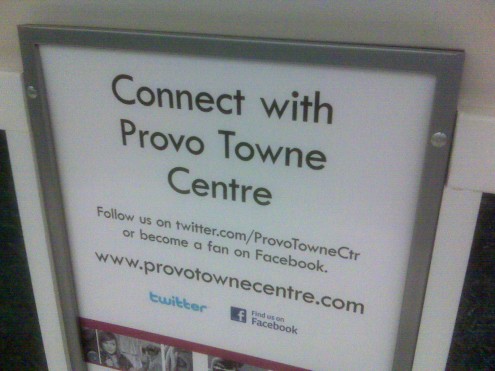Samuel L. Jackson is waiting for you to follow me on Twitter…

Just do it: @blakesnow. Don’t make him mad. You don’t want to see him mad.

Just do it: @blakesnow. Don’t make him mad. You don’t want to see him mad.
Ev Williams believes the internet is “a giant machine designed to give people what they want.” In a speech reported by Wired, the co-inventor of Blogger and Twitter added, “We often think the internet enables us to do new things, but people just want to do the same things.”
For instance, we want to socialize, entertain ourselves, learn, and make work easier. The internet does all four better than any other convenience of the last century.
It does this in two ways, Williams explains. “Big hits on the internet (think Google, Facebook, Apple, Amazon) are masters at making things fast and not making people think… But the internet is not a utopian world. It’s like a lot of other technological revolutions.” Continue reading…

Because everyone wants to follow and friend a shopping mall. Way to think big, guys.
Written by Chicken Little of the Digital Age
Technology is making us stupid.
Don’t believe me? Read this story about how Apple is now tracking the exact location of iPhone users and sharing it with advertisers.
Or this one documenting numerous Facebook security holes.
Or how have slowly made themselves more vulnerable while broadcasting there whereabouts on Twitter (NOTE TO BURGLARS: When I message that I’m away from home, don’t believe me).
Or the mother of all “You’re freakin’ crazy” behavior: The whole idea behind Foursquare (aka willingly telling the world your precise location so marketers and predators could potentially exploit you.)
I’m not saying the above mentioned technologies aren’t without their advantages. Or that we should shun the use of such technology.
But our intimate relationships with many (if not all) of these technologies have gone too far. As a result, our privacy has been compromised. In many ways, we’ve become our own oppressors. Obsessive sharing might even have consequences on our freedom.
The good news is that much of this can be reversed by hitting the power button or delete button. Of course, you need to know where you’ve posted personal information online, including photos. Delete the ones that no longer (or never did) have any utility.
But most of all, be wary of publishing anything online you wouldn’t broadcast on your front lawn (including your blog).
Now back to regularly scheduled TMI…
DISCLOSURE: This post was written by a protective husband and father. (D’oh! I did it again.)
 Five years ago this week, I launched Smooth Harold. Coolest blog evar! Since its launch, if one thing has changed the site more than anything else, it’s been Facebook.
Five years ago this week, I launched Smooth Harold. Coolest blog evar! Since its launch, if one thing has changed the site more than anything else, it’s been Facebook.
A quick glance at my front page reveals that not many people comment like they used to, even though traffic levels have remained the same. Since my blog is syndicated to my Facebook account, many readers prefer to comment there instead of here.
(Admittedly, I don’t post as much content as I used to, since Facebook is a superior way of bookmark sharing and pithy status updates.)
But maybe it isn’t just Facebook or Twitter that’s changed where people communicate online. Maybe the interest in the comment has waned. I remember when posting a comment was pretty fun. It was empowering. Now it’s almost blasé. And it’s annoying to skim through so many trolling comments. So commenting on Facebook, among trusted friends and family, ensures you don’t have to deal with the latter.
At the same time, I can recall numerous occasions where a complete stranger left an inspiring comment on my blog, something Facebook can’t offer (although Twitter can). So perhaps online commenting has become more insular, less democratic. At least on a personal level.
Or maybe it’s just me. Maybe I’m out of touch. (Is this thing on?)
I was pretty stoked by the U.S.’s 2-0 victory over Spain today, which vaulted the unlikely team into the final of the Confederations Cup, a World Cup warmup. In my excitment, I do what I always do: head to Twitter Search (no account required) to start reading immediate reactions from fans. (Google is just too slow sometimes.)
Without an active Twitter account, I don’t participate in the conversation—I do that elsewhere; on my blog, on Facebook, and in various comment sections. But it’s fun to get up-to-the-second reactions to breaking news in one location, without perpetrating your offline life like so many Twitter users seem to do.
 EDIT: I caved.
EDIT: I caved.
If you like status updates, but don’t want to invest time managing both a Facebook and Twitter account, here’s an easy way to make Status Updates act like Tweets:
You could just sign up for a Twitter account and enjoy a few additional networking opportunities, but I don’t know a Tweeter who isn’t also a Facebooker. With 50 million strong, the same cannot be said of Facebookers. As a bonus, rolling your own status updates gives you greater control and lets you keep all your third-party social networking efforts in one consolidated place. Sweet!